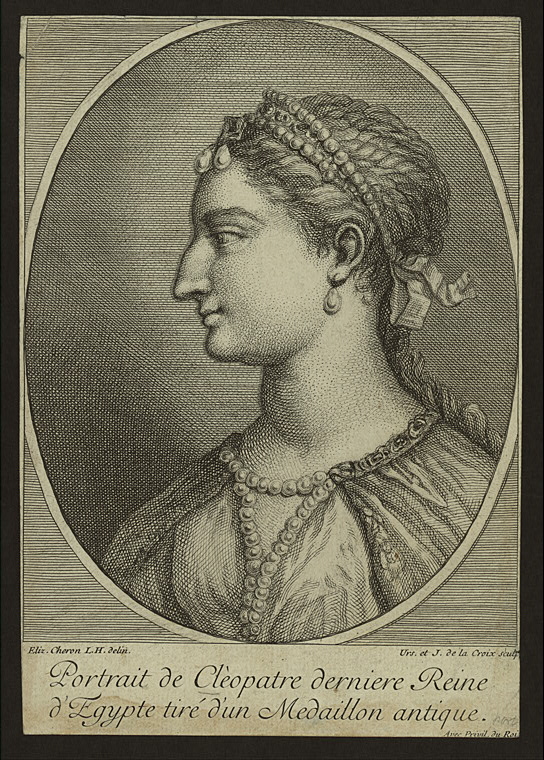When people hear the name Cleopatra, they often associate this name with a woman whose charms and seduction powers led her to bedazzle two of the most powerful men in Roman history, Julius Caesar, and Mark Antony. But what were her intentions in her entanglements with these two important historical figures? Roman history portrays her as a woman “foolish enough to think that she might one day rule Rome, and devious enough to lure a decent man (Caesar) away from his heart and home.” 1 This depiction, however, does not entirely describe the woman who could control and keep one of the most significant empires in history. Cleopatra’s relationships with Julius Caesar and Mark Antony provided her with resources to reestablish a strong Egyptian empire, which, despite her efforts, would later come to an end with her death. Cleopatra’s portrayal in history has been limited to her relationship with these two Roman generals, and Roman historians have generally given her a bad reputation.2 There has been little emphasis on other aspects of her life, her accomplishments, and her reign as the last queen of the Egyptian empire.

Cleopatra VII was the last monarch of Egypt, and many would think that she was, therefore, Egyptian, but what many may not know is that she was actually Greek. Born in Alexandria, Egypt, Cleopatra was a direct descendant of the Macedonian Ptolemaic dynasty.3 The Ptolemies had ruled Egypt since the death of Alexander the Great in the early fourth century B.C.E. Cleopatra was not only the last monarch of Egypt but also the last Ptolemaic ruler.4 She was also the only Ptolemaic ruler who learned the Egyptian language.5
When Ptolemy XII Auletes (Cleopatra’s father) died in 51 B.C.E., the throne of Egypt was taken by the seventeen-year-old Cleopatra and her brother, the ten-year-old Ptolemy. The two of them then ruled as Cleopatra VII and Ptolemy XIII.6 Brother and sister ruling together did not mean problems would be limited. In fact, a few years after Cleopatra and Ptolemy took the throne of Egypt, Ptolemy started a new dating system, and he also claimed sole rule of Egypt from his father’s death. In the summer of 49 B.C.E., Cleopatra’s name disappeared from all Egyptian official documents, and Ptolemy XIII proclaimed himself as the sole ruler of Egypt, forcing Cleopatra to leave Alexandria.7 This event was what led her to meet Julius Caesar. As a Roman officer, Caesar had the power of intervening in the problems between Cleopatra and her brother. His attempts would have been successful if not for the intervention of Ptolemy’s allies who opposed allowing Cleopatra to rule again. After the known Alexandrian War, Cleopatra was restored by Caesar to the throne of Egypt after the death of her brother Ptolemy XIII in the war.8 These events started Cleopatra’s relationship with Caesar, a romance from which Caesarion, the first son of Cleopatra, was the fruit. Cleopatra’s relationship with Caesar not only gave her back control over Egypt, but it also meant protection from Rome; and for Caesar, it meant an access to Egypt’s wealth.9

Besides the power she gained from her relationship with Caesar, Cleopatra’s marriage with Mark Antony, after Caesar’s death, led her to accomplish the restoring of the Egyptian empire. Mark Antony believed that the greatness of the Roman empire “consisted more in giving than taking.”10 Based on this belief, Antony gave his new wife, Cleopatra, extensions of land stretching from the Mediterranean coast, “from Cilicia, through Syria and Phoenicia, large past of Judaea, Lebanon and the Arab state of Ituraea.”11 Cleopatra’s intentions in restoring Egypt were also manifested by the names she chose for her children. Her first son, Caesarion, was named after Julius Caesar, claiming that her son was indeed the son of this important Roman figure.12 She also had three more children with Mark Antony. Their names also reflected Cleopatra’s ambitions. The twins, Alexander Helios and Cleopatra Selene, were named in honor of her family lineage. Alexander Helios was named after Alexander the Great as the sun god Helios. This character represented the role model of Ptolemy III, who extended the power of the Ptolemaic rulers to its greatest extent. In the same way, the name of Cleopatra Selene was inspired from the goddess Isis, a figure that had represented and ruled most of the region within the Ptolemaic and Seleucid lineage. For this reason, Cleopatra Selene was the most convenient name to manifest Cleopatra’s attempts to unify Egypt and Syria under her control.13 Her last child was named Ptolemy Philadelphus, named after the man who had ruled the territories she obtained when she married with Mark Antony.14

Cleopatra’s relationship with Mark Antony, although it gave her power and control over a large number of territories, also brought the end of her reign and, consequently, the end of the Egyptian empire. When Antony established that Caesarion and his three children with Cleopatra would rule Egypt and the Roman provinces in Asia minor, Octavian, adoptive child of Caesar and Antony’s first wife’s half-brother, declared war on both Antony and Cleopatra. The known Battle of Actium in 31 B.C.E. went badly for Antony, and it started the fall of Egypt and her queen. When Cleopatra realized her defeat was inevitable, she committed suicide in 30 B.C.E., marking the end of the Ptolemaic rule and the fall of Egypt to Roman control.15

Undoubtedly, Cleopatra was very intelligent in relating with both Julius Caesar and Mark Antony, and by consequence obtaining great power and control. She may have recognized that the aid of two of the most important Roman generals could eventually lead her to achieve her ambitions of extending the Egyptian empire.16 However, she never accomplished her intentions. Her ambitions were strongly highlighted by her relationship with the two Roman generals, and these two men provide her with the resources she needed to obtain the establishment of a stronger Egypt. Her determination in achieving what she aimed for is admirable.
Although Roman history has portrayed her as a bad woman dangerous for Rome, as followed by the propaganda of Octavian,17 Cleopatra not only related herself with two of the most important men in Roman history, but she also created a pathway towards the unification of a kingdom. She might have been successful if not for the events that led to the fall of her reign.
- Joyce A. Tyldesley, Cleopatra: Last Queen of Egypt (New York: Basic Books, 2008), 206. ↵
- Salem Press Biographical Encyclopedia, January 2015, s.v. “Cleopatra VII,” by Frances Stickney Newman. ↵
- J. Fletcher, Cleopatra the Great: The Woman behind the Legend (New York: HarperCollins, 2011), I. ↵
- Salem Press Biographical Encyclopedia, January 2015, s.v. “Cleopatra VII,” by Frances Stickney Newman. ↵
- Salem Press Encyclopedia, January 2015, s.v. “Ptolemaic Dynasty,” by Milton Berman. ↵
- Salem Press Biographical Encyclopedia, January 2015, s.v. “Cleopatra VII,” by Frances Stickney Newman. ↵
- Tyldesley, Cleopatra: Last Queen of Egypt, 48. ↵
- Salem Press Biographical Encyclopedia, January 2015, s.v. “Cleopatra VII,” by Frances Stickney Newman. ↵
- Tyldesley, Cleopatra: Last Queen of Egypt, 57. ↵
- Fletcher, Cleopatra the Great: The Woman behind the Legend, 268. ↵
- Fletcher, Cleopatra the Great: The Woman behind the Legend, 268. ↵
- Salem Press Biographical Encyclopedia, January 2015, s.v. “Cleopatra VII,” by Frances Stickney Newman. ↵
- Fletcher, Cleopatra the Great: The Woman behind the Legend, 264. ↵
- Fletcher, Cleopatra the Great: The Woman behind the Legend, 270. ↵
- Salem Press Biographical Encyclopedia, January 2015, s.v. “Cleopatra VII,” by Frances Stickney Newman. ↵
- Salem Press Biographical Encyclopedia, January 2015, s.v. “Cleopatra VII,” by Frances Stickney Newman. ↵
- For a clear example of Octavian’s propaganda, see Book IV of Virgil’s Aeneid and his portrayal of the African queen of Carthage, Dido. ↵



58 comments
Aneesa Zubair
Many people remember Cleopatra in relation to Julius Caesar and Mark Anthony, so that her political influence and genius is often ignored. Through her relationship with Julius Caesar, Cleopatra was able to regain control of Egypt from her brother. She did everything she could to protect Egypt from decline. Though she could not keep the Egyptian empire from falling under Roman control, her struggle to restore and preserve it was nonetheless impressive.
Annissa Noblejas
I feel that Cleopatra VII was definitely no one’s fool when it came to governing her kingdom. She was known to speak multiple languages and a brilliant diplomat. The fact that she entangled herself with two of Rome’s most powerful men in history is no accident or woman’s passion. She may have in fact loved these men, but the seduction and resulting children were at least in part a strategy to first obtain and later further her political position.
Faten Al Shaibi
Cleopatra is a very well-known name in history. All I knew about her that she was a queen of Egypt in the past.I did not know her full story and I did not read before about her marriage from
the most important men of Roman history.
Actually she is a strong woman and his leader is smart and witty.
Marina Castro
Cleopatra is a well-known figure in history. Controversial ideas are always heard around Cleopatra’s name. Some see her as a strong and brilliant leader, while others depict her as a woman not worthy of Egypt’s throne. This article has done her justice in informing the reader about what her life was like and how she obtained so much power. Cleopatra should receive credit for how far she was able to take Egypt.
Iris Henderson
I really enjoyed this article. I like that the author did their research and found that she wasn’t just this beautiful tragedy but a great leader that was strategic and used logical. Perhaps with men this way of being successful isn’t frowned upon or even spoken about but with a woman it leaves some in awe. She absolutely did all that she could to attain her goal and although she fell a bit short, her story is still being spoke of today.
Natalia Flores
Very interesting! I didn’t know that Cleopatra was one, the last Ptolemaic ruler in Egypt. Second, she was the last ruler to learn the Egyptian language! It really struck me that her own brother would purposefully try to get rid of his sister even though he was only a young teenager. I would like to know what happened to her children? Since she did kill herself and Mark Anthony also died shortly afterwards, who took care of them and where did they go?
Regina De La Parra
Cleopatra is a very inspiring woman because of all she did to get her place on the throne even though she was a woman. But something I did not know is how much she suffered and how much she endured to accomplish this. The author of the article did a great job explaining all that Cleopatra was and how much she did for Egypt even though she was Greek. Good job Jocelyn!
Arianna Kennet
Funny how I came across this article as I had to just write an essay about her, so I have a bit more insight on her and her history. Cleopatra is known to some people as a seducer, and merely used men for pleasure, but if you read the history of her, it would prove otherwise. She was a great woman who was able to rule Egypt at the tender age of fifteen. She was also very smart when it came to getting out of situations.
Julian Aguero
Cleopatra’s cleverness is truly underestimated. She must be one of the most fascinating people to be around ever. Her life in combination with the life of Caesar and Antony seems like something that is only made up in mythology. I love reading story’s about powerful women in history who are sincerely inspirational. Cleopatra must have had massive influence over her lovers. Its unfortunate that she ultimately brought death to both lovers and then eventually herself. Still Cleopatra contributed to large success to both Antony and Caesar and the merger of an empire.
Thomas Fraire
This was a great written article I really enjoyed it. Coming into this I had little knowledge about Cleopatra other than her encounters with Julius Ceasar. I had no prior or other knowledge that she also interacted with Mark Anthony, and how they helped her become a better ruler and a more successful ruler as the last Ptolemaic Ruler in Egypt.